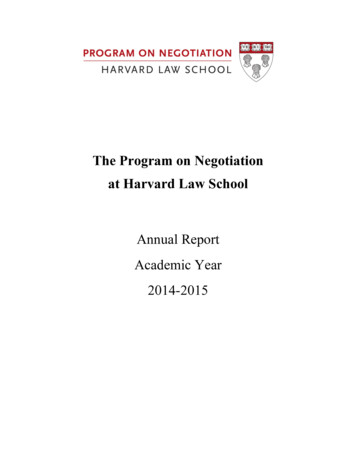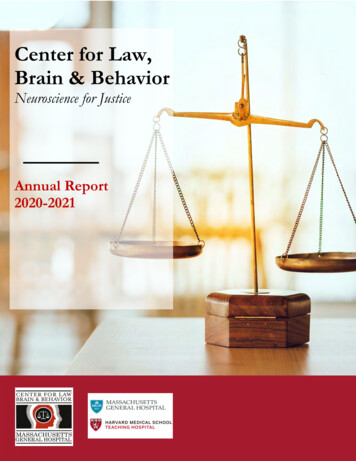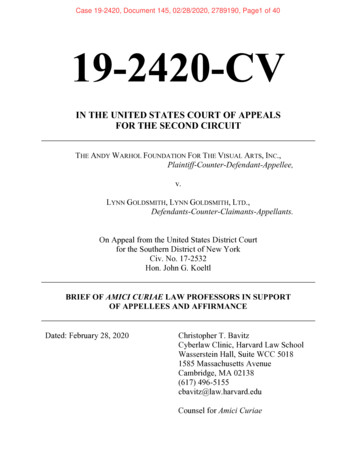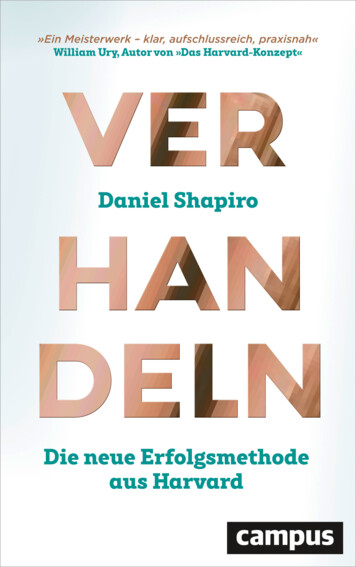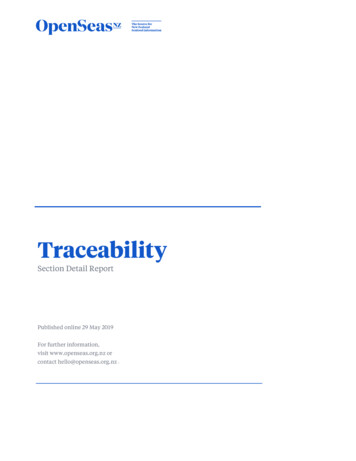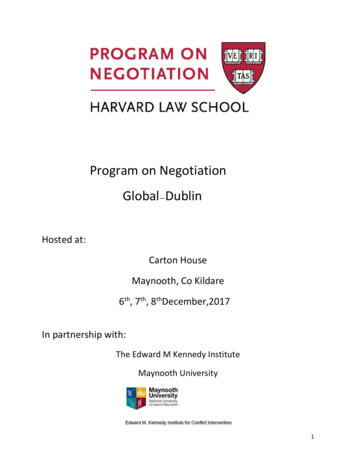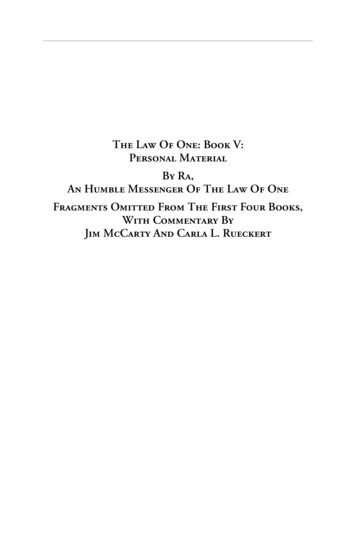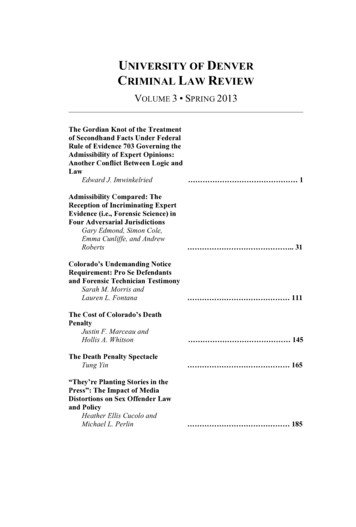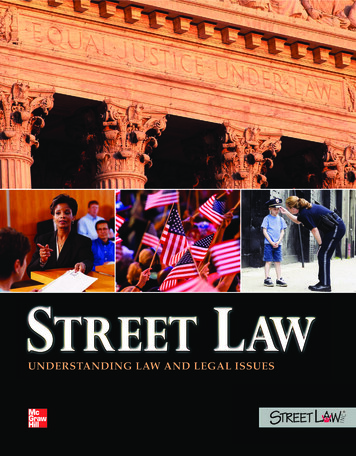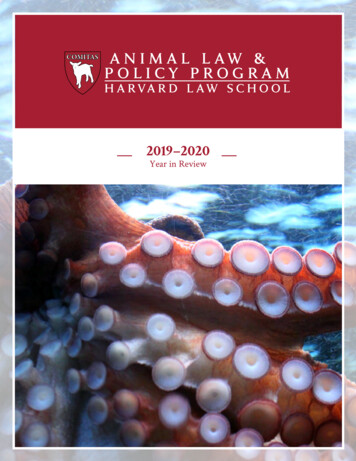
Transcription
A N I M A L L AW &POLICY PROGRAMH A R VA R D L A W S C H O O L2019 –2020Year in Review
Animal Law & Policy Program Harvard Law School Year in Review 2019–2020TABLE OF CONTENTSIntroduction & Executive Summary3People4Program Work & Achievements8Academic Courses15Animal Law & Policy Program in the Media22Policy & Practice29Program Events34Placement40Scholarship & Presentations42Looking Forward to the 2020–2021 Academic Year64Animal law is a vitally important and rapidlygrowing field. Our new Animal Law & PolicyClinic will give students real-world experiencein this burgeoning field, build on Harvard LawSchool’s long tradition of innovative pedagogy,and prepare future graduates to addresssignificant societal challenges.”2— John F. Manning ’85, Morgan and Helen ChuDean and Professor of Law
AnimalAnimal LawLaw && PolicyPolicy ProgramProgram HarvardHarvard LawLaw School Year in Review 2019–2020INTRODUCTION & EXECUTIVE SUMMARYAs we celebrate our sixth anniversary, the Animal Law & Policy Program (ALPP) atHarvard Law School (HLS) is proud to share the work we have done to benefit the livesof animals farmed for food, animals used in biomedical research, animals affected byclimate change, and those suffering a multitude of other harms. We also have continuedour efforts to benefit animals by addressing the regulation of plant-based and cell-basedalternatives to animal products and working to achieve justice for families affected bynoxious factory farms being built beside their homes.The interconnected dimensions of injusticeIn these times, such work and collaboration,have never felt more present, and highlightat home and around the world, are morethat we cannot simply pull out oneimportant than ever. When the pandemicstrand and work on it in isolation withoutcaused us to shift our work to a remotean awareness of how others might beformat in March 2020, we rapidly adaptedimpacted. This past fall and spring, the workto the virtual realities and reached evenof the Program, the Clinic, and our faculty,broader and more diverse audiences. Thisstaff, and Visiting Fellows has reflected ourreport highlights the work of the past year,commitment to these principles. Such workshowing our substantial impact through ourincludes Visiting Fellow Amy Fitzgerald’sextensive activities, scholarship, and policyfocus on animals in Intimate Partnerwork. Because our Program and Clinic areViolence, Executive Director Chris Green’sentirely donor funded, this work would notefforts to reduce the number of dogs killedbe possible without the generous support ofby police, and Clinical Instructor Nicoleindividuals and institutions that include:Negowetti’s advocacy for just food systems. Bob BarkerProfessor Justin Marceau’s research Virginia Colemanrethinking criminal punishment in animal Simone Friedman Brad Goldberg Phillip and Lynne Himelstein Ariel Nessel / Mobius Charles Thomas Animal Welfare Trust Brooks Institute for Animal Stray Dog InstituteOther contributions include Visitinglaw, Clinic Director Katherine Meyer’ssupervision of the Clinic’s challenging theenvironmental impacts of the proposedborder wall, and Faculty Director KristenStilt’s work at the intersection of animalprotection and religion. The Program itselfalso recently launched a collaborativeinternational research project with a team ofinstitutional partners to examine the globalregulation of live animal markets and theirrole in the spread of zoonotic disease.Rights Law & Policy3
Animal Law & Policy Program Harvard Law School Year in Review 2019–2020PEOPLEAnimal Law & Policy Program Faculty and StaffThe Animal Law & Policy Program is led by Harvard Law School Professor Kristen Stilt, wholaunched the Program in 2014. She also directs Harvard’s Program on Law and Society in theMuslim World. For the past three years, Professor Stilt served as Deputy Dean of Harvard LawSchool, helping guide the institution’s response to the global pandemic and ongoing societalstruggles to remedy deeply embedded problems of inequality, racism, and abuse of power. HerDeputy Dean term concluded on June 30, 2020, and in the upcoming academic year she will bethe Maury Green Fellow at the Radcliffe Institute.Executive Director Chris Green works with Professor Stilt to oversee the Program’s strategicplanning, coordinating, and development efforts. Program Administrator Ceallaigh Reddymanages all administrative and organizational needs. For the past year, Visiting AssistantClinical Professor Katherine Meyer has been the Director of our Animal Law & Policy Clinic,working alongside Clinical Instructor Nicole Negowetti. Sarah Pickering has overseen theProgram and Clinic’s media efforts as Communications Manager, and Kate Barnekow hasserved as our first Clinical Fellow. Ann Linder also joined the team in June as a ResearchFellow managing our live animal markets project.Kristen StiltFaculty DirectorNicole NegowettiClinical Instructor4Chris GreenExecutive DirectorSarah PickeringCommunications ManagerCeallaigh ReddyKatherine MeyerKate BarnekowAnn LinderProgram AdministratorClinical FellowClinic Director, VisitingAssistant Clinical ProfessorResearch Fellow
Animal Law & Policy Program Harvard Law School Year in Review 2019–2020Visiting Fellows & ResearchersIn addition to our core team, each year the Animal Law & Policy Program hosts several VisitingFellows and Visiting Researchers. These visiting appointments provide opportunities foroutstanding scholars from a range of disciplines and legal practitioners to spend a semesteror academic year in residence at HLS working on their own research, writing, and scholarlyengagement on projects in the field of animal law and policy. During their stay they make use ofthe research facilities of the Law School and the University, participate in the intellectual life of thecommunity, and present their scholarship in academic workshops. This past year we hosted eightVisiting Fellows (whom we fund after a formal application and selection process), and two VisitingResearchers (who come to HLS with outside funding).The work of the Visiting Fellows and Researchers garnered significant media coverage over thepast year, drawing public attention to animal law and policy issues. The outlets providing suchexposure included: CNN, CBS, Daily Mail, Financial Times, Fox, The Guardian, Independent, TheIntercept, Medium, The New York Times, The Washington Post, and Wired.Our 2019–2020 Visiting Fellows and Researchers are listed alphabetically below with their researchproject titles:Hadar AviramProfessor, UC Hastings College of the Law“Criminal Legal Consciousness” and Legal Mobilization StrategyAmong Open Rescuers from Factory FarmsCharlotte BlattnerSenior Lecturer and Researcher, Institute of Public Law, University of BernCritical Intersections of Animal and Environmental LawOmar FarahatAssistant Professor, McGill University Faculty of LawPersonhood in Islamic Legal Theory5
Animal Law & Policy Program Harvard Law School Year in Review 2019–2020Amy FitzgeraldAssociate Professor, Great Lakes Institute for Environmental Research,University of WindsorSocial Recognition of Animals Ab(Used) in the Context of Intimate PartnerViolence: A Strategic Avenue for Broader Socio-Legal ChangeHelen HarwattIndependent ResearcherAssessing the Impacts of Food Systems on Environmental Sustainability,Public Health, and EthicsJim KeenProfessor, University of NebraskaA Tapestry of Cruelty and Waste: Failed Federal Intramural Animal ResearchJayasimha NuggehalliCo-Founder and Chief Operating Officer of Global Food Partners; FormerManaging Director, Humane Society International – IndiaHelping Companies Meet Animal Welfare Commitments throughCertificate Trading PlatformSteven NiemiFormer Director, Office of Animal Resources, Harvard UniversityFaculty of Arts and SciencesEthical Gaps in Today’s Pet Breeding Standards6
Animal Law & Policy Program Harvard Law School Year in Review 2019–2020Gale E. RasinSenior Judge, Baltimore City Circuit CourtAnimal Hoarding: The Judicial ResponseSaskia StuckiSenior Research Fellow, Max Planck Institute for Comparative Public Lawand International LawElements of a Legal Theory of Animal RightsHuman Rights and Animal RightsIntersectional Humanitarian Law and Animal Welfare Law7
Animal Law & Policy Program Harvard Law School Year in Review 2019–2020Program Work & AchievementsThe Animal Law & Policy Program and Animal Law & Policy Clinic had a productive year of scholarlyactivity, research, events, and litigation. Below we outline many of these accomplishments.Live Animal Markets ProjectIn June, the Program embarked on an ambitious project studying policy responses to live animal markets,which have been identified as sites that facilitate the transmission of zoonotic diseases such as avianinfluenza, Severe Acute Respiratory Syndrome (SARS), and COVID-19. These markets and the supply chainsthat support them are the source of many types of high-risk human-animal and animal-animal interactions.Animal markets exist throughout the world, including in the United States.The project aims to provide a comprehensive assessment that will aid policymakers considering regulatorydecisions, contribute to public education about these issues, and serve the human health and animalprotection NGO communities. It will include individual country case studies conducted by international partnerinstitutions. Former ALPP Fellow Ann Linder has returned to serve as the Research Fellow managing theproject, which will culminate in a substantial published report in early 2021.Collaborating partners on the project include New York University’s Center for Environmental and AnimalProtection, Federal University of Bahia (Brazil), Lewis & Clark Law School’s Center for Animal Law Studies,National Academy of Legal Studies & Research (India), University of Denver’s Sturm College of Law,University of Ghana’s College of Health Sciences, University of KwaZulu-Natal (South Africa), Universidad delPacífico’s Environmental Management Clinic (Peru), University of Toronto Faculty of Law, University of VictoriaFaculty of Law, Vietnam One Health University Network, Yale Law School’s Law, Ethics & Animals Program,and Zhongnan University of Economics and Law (Wuhan, China). The project is being supported by generousfunding from the Brooks Animal Studies Academic Network (BASAN).8Credit: Jo-Anne McArthur/We Animals
Animal Law & Policy Program Harvard Law School Year in Review 2019–2020Brooks Animal Law DigestClinical Fellow Kate Barnekow performs daily researchon recent developments in the field of animal law andpolicy as well as relevant items in environmental law,food law, and administrative law. She then createsBrooks Animal Studies AcademicNetwork (BASAN)weekly summaries of the latest developments in federalBASAN is a network of academicsand state case law, new and pending federal and stateand their institutions with the missionlegislative initiatives and enactments, federal regulatoryactions, published scholarship, and international newsof advancing scholarly knowledge andrelated to animal law. The resulting Brooks Animalacademic opportunities in animal law,Law Digest is disseminated exclusively by the Brookspolicy, and related animal studies.Institute for Animal Rights Law & Policy without chargefor the benefit of the animal welfare community at large,including practitioners, academic clinics and programs,Current member institutions include:and scholars. Harvard Law School’s Animal Law &These weekly updates draw from a wide swath of subject Lewis & Clark Law School’s Center for New York University’s Center for University of Denver’s Sturm College University of Toronto Faculty of Law University of Victoria Faculty of Lawthe Animal Welfare Act, the Endangered Species Act, Wesleyan University, Animal Studiesthe Marine Mammal Protection Act, the Federal Meat Yale Law School’s Law, Ethics &areas that impact nonhuman animals’ lives, including theregulation of animal testing and research, the advertisingand sale of animal products, breed-specific restrictions,setting up trusts for the care of companion animals, thetreatment of companion animals in domestic violencecases, the conditions of animal breeding and slaughteroperations, cultivated meat products, hunting, pollution,and wildlife in captivity. The digest also follows litigation,legislation, and regulation under key animal law statutesand other statutes often utilized in the field, such asInspection Act, the Humane Methods of Slaughter Act,the Poultry Products Inspection Act, the Freedom ofPolicy ProgramAnimal Law StudiesEnvironmental and Animal Protectionof LawAnimals ProgramInformation Act, and the Administrative Procedure Act.These updates also cover a wide variety of types ofanimals, including aquatic animals, companion animals,animals used for food and fiber, and captive wild animals.The Brooks Animal Law Digest serves as a valuableresource for anyone seeking to keep up to date on thelatest developments in the field of animal law and policy.Anyone interested can subscribe to the Brooks AnimalLaw Digest.9
Animal Law & Policy Program Harvard Law School Year in Review 2019–2020Credit: Martha StewartAnimal Law & Policy ClinicThe launch of the Animal Law & Policy ClinicClinic Director Katherine Meyer joined HLS as(ALPC) in September 2019 has enabled Harvardone of the most experienced animal protectionLaw School students to work directly on real-timelitigators in the country, having founded the nation’sanimal law cases and policy projects, providingleading environmental and animal public interestthem with hands-on experience in policymaking,law firm, Meyer & Glitzenstein, 26 years ago.research, litigation, legislation, administrativeClinical Instructor Nicole Negowetti is a nationallypractice, and organizational governance––both inrecognized food systems policy expert who hasthe US and internationally.focused her teaching, scholarship, and advocacyon the impacts of industrial livestock productionAs Harvard Law School Dean John Manning noted,“Animal law is a vitally important and rapidly growingfield. Our new Animal Law & Policy Clinic will givestudents real-world experience in this burgeoningfield, build on Harvard Law School’s long tradition ofinnovative pedagogy, and prepare future graduatesto address significant societal challenges. I amon animal welfare, the environment, and humanhealth. In addition to her work at ALPC, in the 2019fall semester Nicole also taught a reading groupon “Disruptive Food Technologies: Law, Politics,and Policy.” Recent HLS graduate Kate Barnekowserves as our first Clinical Fellow assisting on Clinicprojects and research.delighted to welcome Katherine Meyer to theHarvard Law School community and congratulateTwo of the Clinic’s most recent cases filed to protecther, Kristen Stilt, and Nicole Negowetti on theprimates used in research and protect families fromlaunch of this terrific initiative.”noxious factory farms were chronicled in exclusiveI got real substantive experience working on a wide variety of types of animaladvocacy. Kathy and Nicole are great and were strongly encouraging and supportive.I appreciate feeling like I can turn to them in the future for mentorship.”10
Animal Law & Policy Program Harvard Law School Year in Review 2019–2020features in the Boston Globe and Indianapolis Star.Those articles and coverage of the Clinic’s otherprojects appear in a media timeline on page 22 ofthis report. Following is a chronological list of theClinic’s most important work of the past year.In October 2019, the students participated in apublic meeting held by the US Food and DrugAdministration (FDA) in Washington, DC, whichwas seeking input on the agency’s efforts to updateits “standards of identity” for alternatives to animalbased food products. Clinic student Gabriel Wildgen’20, provided oral testimony calling for flexibility infood labeling in the interests of both consumers andinnovation. The Clinic subsequently submitteda detailed letter to the USDA recommending alabeling scheme that does not ban the use ofcommon and usual meat and poultry terms on cellbased meat products and only requires disclosureswhen they are necessary to protect consumers. Theletter was drafted by student Kelley McGill ’20 underthe supervision of Clinic Instructor Nicole Negowettiand generated substantial attention, especiallyamong meat industry outlets.The Clinic filed its first lawsuit in November. Thecase was brought against the USDA under theAdministrative Procedure Act over the agency’sunreasonable delay in failing to take actionon a petition to upgrade the standards for thepsychological well-being of primates used inbiomedical research. The case was filed on behalfof the New England Anti-Vivisection Society(NEAVS), Animal Legal Defense Fund, and theInternational Primate Protection League. TheBoston Globe did a major story on the case, quotingClinic student, Brett Richey ’21, who took the leadon the project:“We are bringing this case to compel the USDA toput in place clear, enforceable laws that will easeWe are bringing this caseto compel the USDA to putin place clear, enforceablelaws that will ease theburden of suffering onnonhuman primates, someof our closest relativesin the animal kingdom.These animals deserveour protection.”— Clinic student Brett Richey ’2111
Animal Law & Policy Program Harvard Law School Year in Review 2019–2020the burden of suffering on nonhuman primates,the constitutionality of the Trump Administration’ssome of our closest relatives in the animal kingdom.waivers of all environmental laws that wouldThese animals deserve our protection.”ordinarily apply to construction of the border wall.The ALPC brief was drafted by graduating studentDuring the fall term students also prepareddetailed evidentiary analyses of chronic violationsof the Animal Welfare Act (AWA) to assist withthe passage of the Animal Welfare EnforcementImprovement Act, H.R. 4211. That legislation wasAshley Maiolatesi ’20 with help from ClinicalFellow Kate Barnekow. You can read an interviewwith Ashley in Harvard Law Today in which shediscusses the impact of the border wall on animalsand the ecosystem.introduced in August 2019 by Congressman RajaKrishnamoorthi (D. Ill.), and would create a much-The Clinic also filed an amicus brief in the Ninthneeded private right of action under the AWA. TheCircuit Court of Appeals on behalf of six scientistsstudents also prepared a synopsis of the proposedin support of a case by the Center for Biologicallegislation and an analysis of the problems withDiversity challenging the Trump Administration’scurrent enforcement of the AWA to be used inrefusal to list the Pacific walrus as “threatened”lobbying efforts by the animal protection community.under the Endangered Species Act. The legalThe clients in that matter were the Animal Welfarechallenge is based on the deleterious effects ofInstitute and People for the Ethical Treatment ofclimate change on sea ice in the Arctic, uponAnimals.which the walrus depends for essentially all of itslife functions. The brief was drafted by RebeccaAt the beginning of the spring semester, the ClinicGarverman ’21 and Kate Barnekow.filed an amicus brief before the US Supreme Courtover the potential wildlife impacts from constructionIn June, the Clinic filed a comprehensive petitionof a border wall between Mexico and the Unitedwith the National Institute of Health’s PublicStates. The brief was filed on behalf of the NationalHealth Service calling on the agency to includeButterfly Association and the National Butterflycephalopods (octopus, squid, and cuttlefish) amongCenter in Texas in support of a petition for certiorarithe “animals” entitled to receive the minimumby the Center for Biological Diversity, Animal Legalprotections for “humane handling and care” requiredDefense Fund, Defenders of Wildlife, and Southwestfor federally funded animal research. The petitionEnvironmental Law Center. That petition asked theargues that Congress intended its legislationCourt to review a lower court decision concerning12
Animal Law & Policy Program Harvard Law School Year in Review 2019–2020Credit: Jo-Anne McArthur/We Animalsgoverning research to protect all animals, notThe Indianapolis Star published this exclusivejust vertebrates, and was submitted on behalf ofstory on the petition. The case has broadNEAVS, the American Anti-Vivisection Society,significance beyond Indiana as many other statesPhysicians Committee for Responsible Medicine,also have amended their Right to Farm Acts toHumane Society of the United States, Humaneenact similar provisions that deprive homeownersSociety Legislative Fund, and eight of the world’sof any recourse for nuisance and trespassleading scientific experts on cephalopods.damages against CAFOs––at the behest ofindustry groups like the Farm Bureau and NationalIn July, the Clinic filed a petition for certiorari tothe US Supreme Court in a lawsuit challengingthe constitutionality of Indiana’s Right to FarmPork Producers Council. The Clinic anticipateshaving to draft a reply brief for this matter duringthe 2020 fall term.Act, which eliminated the ability of homeownersto sue for any remedy when large industrial hogThe Clinic filed another lawsuit in July on behalffarms or Concentrated Animal Feeding Operationsof NEAVS and ALDF challenging the USDA’s(CAFOs) are sited next to their homes. The lawsuitdenial of the Rulemaking Petition seeking betterwas filed on behalf of the Hoosier Environmentalstandards for the psychological well-being ofCouncil (HEC) and two families that have had toprimates used in research (which the USDAendure noxious fumes and toxic particles invadingissued after the Clinic filed its unreasonable delaythe houses where they have lived for decades.case discussed above). That case that will belitigated during the upcoming academic year. TheClinic students Boanne Wassink ’20 and AndrewStawasz ’21 prepared the petition under thesupervision of Clinic Director Katherine Meyer andcomplaint was prepared by Brett Richey ’21 andRebecca Garverman ’21 and was covered by theBoston Globe.HEC attorney Kim Ferraro. The petition arguesthat the Indiana statute violates the TakingsIn August, Clinic Director Katherine Meyer filedClause of the US Constitution because it deprivesanother amicus brief with the US Supreme Courtthe families of the value of their property withouton behalf of the Center for Biological Diversity andany compensation.Defenders of Wildlife in a Freedom of Information13
Animal Law & Policy Program Harvard Law School Year in Review 2019–2020Act case that the Court will be considering nextThe lawsuit claims that the USDA’s failure toterm. The underlying case, brought by the Sierrarequire humane handling results in adulteratedClub, involves the public’s right of access to(i.e., damaged or contaminated) products thatscientific analyses concerning the adverse impactsviolate the Poultry Products Inspection Act. Itof federal actions on endangered and threateneddemands that the Food Safety and Inspectionspecies. The Trump Administration is arguingService develop regulations requiring the humanethat all records that pre-date an agency’s finalhandling of chickens, turkeys, and other birds atdecision are exempt from disclosure because theyfederally inspected slaughter facilities to addressare “deliberative” in nature, regardless of whetherthe systematic mistreatment of these animals,those records contain purely factual and scientificwhich number over 9 billion annually. Such handlinginformation. If the Supreme Court accepts thatgoes beyond the slaughter process itself, as in oneposition, the public will no longer be able to monitorinstance nearly 10,000 birds froze to death afterwhether the government is accurately representingbeing transported and held for at least 22 hoursthe scientific (and other) impacts of its actions,in unprotected trucks during extreme cold at aincluding, for example, whether those actions areButterfield Foods slaughterhouse in Minnesota. Thecontributing to climate change and whether thefiling attracted much attention, especially in industrygovernment is taking adequate steps to address atrade journals such as Meating Place, Poultryglobal pandemic, such as COVID-19. The brief wasProducer, The Poultry Site, and Agrimarketing.filed in conjunction with Eric Glitzenstein, Director ofLitigation for the Center for Biological Diversity, whowill be teaching Wildlife Law at Harvard Law Schoolin spring 2021.The Clinic’s other continuing projects includeworking on efforts to reduce the use of plastic due tothe pervasive effects on wildlife, strategizing aboutways to address climate change, and challengingAlso in August, the Clinic filed another lawsuitcertain state hunting laws. The Clinic has a full slateagainst the USDA to compel humane handlingof new projects and cases that it will be initiating inof poultry at slaughter, representing plaintiffs thethe coming year.Animal Welfare Institute and Farm Sanctuary.14Credit: Jo-Anne McArthur/We Animals
Animal Law & Policy Program Harvard Law School Year in Review 2019–2020ACADEMIC COURSESAnimal Law CourseDuring the spring semester, Professor Justin Marceau from the University of Denver SturmCollege of Law was a Visiting Professor at Harvard Law School. While here he taught our coreAnimal Law course and also a course on Criminal Procedure: Investigations. Professor Marceauis an alumnus of Harvard Law School and an experienced litigator who was the lead attorneyon the successful constitutional challenges that overturned several state Ag-Gag laws. Hiscourse examined the broad range of legal contexts that implicate the status and well-being ofnonhuman animals, including larger definitional and philosophical questions.The class explored a variety of animal law topics and approaches for understanding “animalrights,” but an overriding theme was to understand whether and to what extent animal protectionshould be considered a civil rights movement. This entailed examining probing questions, suchas: What is the role of activists versus lawyers? What is the role of criminal law in advancingthe agenda of the movement? What is the role of constitutional law, and of science? Do somespecies deserve more legal protections than others, and if so, why?To enrich that inquiry, Professor Marceau enlisted the knowledge of weekly “guest experts” whowould join the class either in person or remotely to share their real-world experiences and takequestions from the students. One novel element of the course was having three PETA attorneysinvolve the students in a live workshop of a litigation theory for a cutting-edge case they werepreparing. As one student explained:We had the chance to read a lawsuit drafted by PETA, and theamazing opportunity to give them our honest feedback in real time.Although as an LLM I already have been practicing law for fiveyears, I think this was a great exercise for us and JDs alike to feellike we were real life animal lawyers.”15
Animal Law & Policy Program Harvard Law School Year in Review 2019–2020Animal Law CourseThis year’s other guest experts included: Amanda Arrington, Director, Pets for Life at The Humane Society of the United States Hadar Aviram, Professor, UC Hastings Law School Josh Balk, Vice President, Farm Animal Protection at The Humane Society of the United States Amanda Howell, Staff Attorney, Animal Legal Defense Fund Wayne Hsiung, Co-Founder, Direct Action Everywhere Cheryl Leahy, General Counsel, Animal Outlook Katherine Meyer, Director, HLS Animal Law & Policy Clinic PETA Litigation Team:– Jeff Kerr, General Counsel, PETA Foundation– Caitlin Hawks, Deputy General Counsel, PETA Foundation– Asher Smith, Litigation Manager, PETA Foundation Marlon Reis, First Gentleman of Colorado Kevin Schneider, Executive Director, Nonhuman Rights Project Kristen Stilt, Professor, Harvard Law School Rabbi Shmuly Yanklowitz, Founder & CEO of Shamayim: Jewish Animal AdvocacyThe 47 students who took the Animal Law course gave great reviews of both ProfessorMarceau and the course:Professor Marceau is an excellent professor! He is clear, engaging,and really cares about the material he’s teaching. He is also veryavailable to students and excited to get to know us. I would be veryhappy to see him join the permanent faculty at HLS.”16
Animal Law & Policy Program Harvard Law School Year in Review 2019–2020Professor Marceau was extremelygenerous with his time, willing toconverse further with us in office hours,discuss and read our papers, get us intouch with the speakers, and think aboutways to continue with our commitmentand interest in animal law. I feel verylucky and honored to have been a partof the class as it was exactly what Iexpected to receive from Harvard.”This was one of my favorite courses I’ve taken at HLS thus far,strengthening my interest in animal law and leading me to applyfor a seat in the Animal Law & Policy Clinic.”Those taking the Animal Law course also included students who werebeing exposed to these ideas for the first time:I took this course without any previous knowledge about AnimalLaw or the Animal Rights Movement. I think this was an excellentclass at the intersection of social justice and doctrinal law applying legal concepts to a very different scope helped tobroaden my perspective on how we understand legal rights,litigation strategies, legal protection, and more.”This year, 3L Boanne Wassink was the student Teaching Assistant for the course.17
Animal Law & Policy Program Harvard Law School Year in Review 2019–2020Animal Law & Policy Clinic SeminarThe Animal Law & Policy Clinic Seminar is the required classroom component for studentsenrolled in the Animal Law & Policy Clinic. In the course, Clinic Director Katherine Meyer andClinical Instructor Nicole Negowetti introduced students to the broad range of substantivearea
The Animal Law & Policy Program is led by Harvard Law School Professor Kristen Stilt, who launched the Program in 2014. She also directs Harvard’s Program on Law and Society in the Muslim World. For the past three years, Professor St
